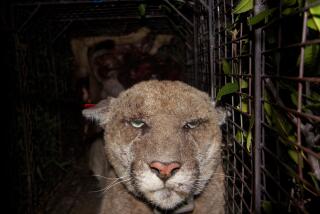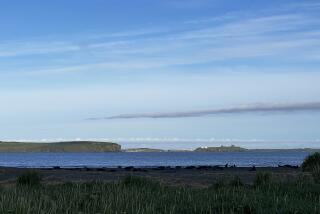Readers React: Rat poison and Griffth Park’s cougar
Re “Rat poisons linked to disease, death in wildlife,” April 17
What makes humans so convinced we can outsmart Mother Nature? Our “kill first” mentality has made us blind to effective, nonlethal solutions to human-wildlife conflicts.
I volunteer at a wildlife rescue; we provide a service that keeps homes rodent-free by sealing cracks where critters enter. Often those who balk at paying $150 for this non- lethal solution don’t think twice about paying a pest control service monthly to spread poisons.
Fewer predators means that rodents flourish, and the cycle of suffering continues.
I’m also on the advisory board of Project Coyote, a coalition of scientists and educators that shares strategies for coexistence. Nonlethal solutions allow us to reap the benefits of living with wildlife. For example, one coyote eats 1,800 rodents a year, providing neighborhoods with a natural pest-control service.
It’s hard to believe, but Mother Nature does just fine without our “help.”
Keli Hendricks
Petaluma, Calif.
As a horse owner and regular rider in Griffith Park, I am a fan of the mountain lion P-22 and all the wildlife there. However, the recent article, and the revelation that P-22 is suffering from the trickle-down effects of rat poison, is disturbing.
While I appreciate the idea of “not messing with wildlife,” have we not already messed with it? P-22 is suffering from the effects of rat poison, and at some point he will want to mate; he’ll have to cross a dangerous road, or he may end up in someone’s yard.
The story of his journey to Griffith Park is an amazing one, but it is not enough to keep him there if he is in danger.
We are able to track and sedate him. For his safety, we might want to remove him from the park to a more remote wildlife area.
Karen Glasser
Los Angeles
The maker of the rat poison d-CON is being disingenuous by saying that its product is not harmful when used as directed. Nobody, least of all the makers of d-CON, can predict where a poisoned rat will end up when it dies or is eaten by a predator.
Protecting the bottom line at d-CON’s maker is not worth the cost of losing predators. The predators are better than poison for controlling rodents anyhow.
Kate MacMahon
Orange
ALSO:
Healthcare reform race has just begun
More to Read
A cure for the common opinion
Get thought-provoking perspectives with our weekly newsletter.
You may occasionally receive promotional content from the Los Angeles Times.










